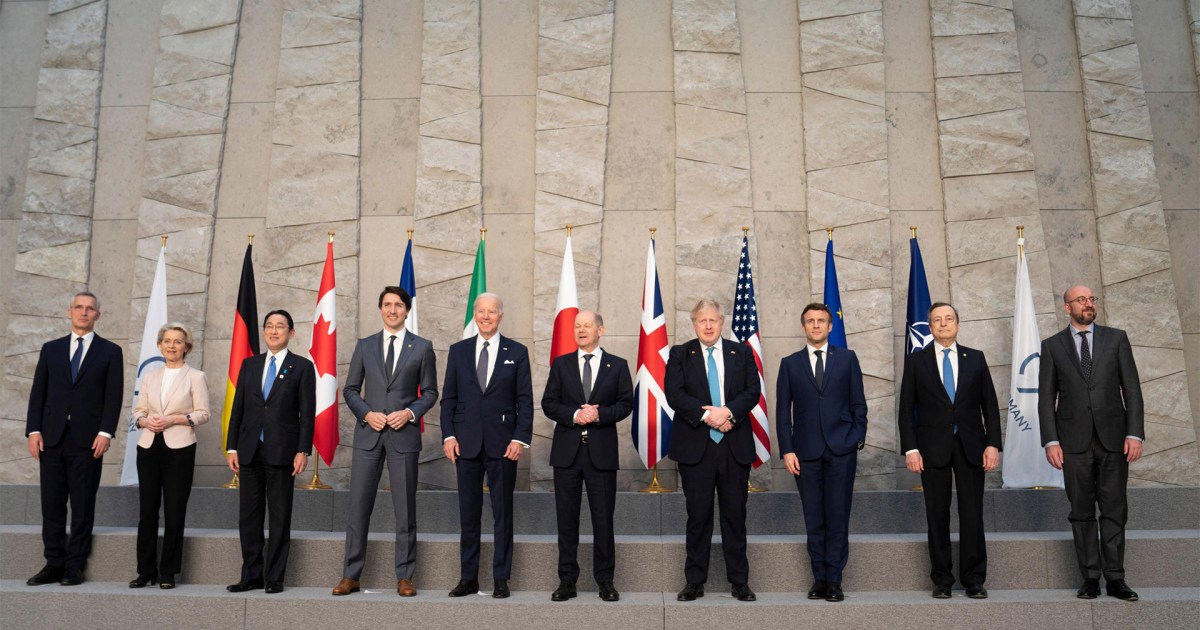US President Joe Biden announced that Russian President Vladimir Putin was "betting on a split in NATO" when he started the war on Ukraine, but the alliance is "more united today than ever," expressing his belief that Russia should be excluded from the Group of Twenty major economies.
Biden said after two summits of NATO and the Group of Seven in Brussels that Putin "did not believe that we would be able to maintain this unity."
"Putin got exactly the opposite of what he wanted when he invaded Ukraine," the US president added, during a press conference before participating in an EU summit.
He pledged that NATO would respond if the Russian leader ordered the use of chemical weapons in Ukraine, and said, "We will respond if they are used," adding that "the nature of the response will depend on the nature of the use."
Biden indicated that there are 100,000 US troops in Europe currently to protect the North Atlantic Treaty Organization (NATO).
For its part, the Group of Seven major industrialized countries said in a statement after their meeting in Brussels that they are ready to impose additional sanctions on Russia if necessary.
The group indicated that it would do everything possible to hold Russian President Vladimir Putin and his supporters to account, and warned of the consequences of any use of chemical weapons in Ukraine.
On the other hand, the Russian Foreign Ministry, in response to the decisions of the NATO summit in Brussels, said that the decision of the NATO summit to continue providing support to Ukraine confirms the alliance’s desire to continue the conflict, and considered that the decision of Western countries to continue providing weapons to Kiev will encourage it to use force against Donbass, and that what it obtains Western countries now "is a terrible harvest."
New sanctions against Russia
In the same context, the United States announced - in coordination with the European Union and the Group of Seven - the imposition of a new package of sanctions against Russia that targeted politicians and financiers close to the authority and the arms manufacturing sector, and included more than 400 individuals and entities.
According to a statement released by the White House, the announced sanctions include a complete ban on 328 members of the Russian State Duma, and a ban on the Council as an entity.
The sanctions list also includes Hermann Gref, head of Russia's largest financial institution, Sberbank, and an adviser to Putin since the 1990s.
It also includes a member of the wealthy elite, Gennady Timchenko, his companies and family members, as well as 17 members of the board of directors of the Russian financial institution "Sofcombank". The new sanctions also include 48 large Russian state-owned defense industrial enterprises.
Biden stressed that "maintaining" sanctions for a long time is "what hurts", expressing his "hope" that China will not help Moscow mitigate the impact of Western sanctions.
"I think China realizes that its economic future depends on its relationship with the West much more than its relationship with Russia, and I hope that it will not engage in easing the impact of sanctions imposed after the invasion of Ukraine," he added.
He also announced that he supports Russia's exclusion from the Group of Twenty, but pointed out that the final decision depends on the members of this international body.
And he considered that, "If Indonesia (president of the Group of Twenty) and other countries do not agree, we must ask that Ukraine be able to attend the G20 meetings."
Macron rejects setting red lines in Ukraine
On the other hand, French President Emmanuel Macron preferred Thursday to keep the ambiguity around what France and its NATO partners consider "red lines" in Ukraine to cross that would call for intervention, especially Russia's use of chemical weapons, considering that "discretion is more effective."
"I will be very careful in this regard," the French president said in a press conference after an emergency NATO summit, because "whenever I have to define what the red lines are, I make sure that their effect is a deterrent and that overcoming them will have repercussions."
"This is how France's words and the words of all allies are respected, and this is what we did in April 2018 during Operation Hamilton," he added, referring to an air raid on Syria that France carried out in cooperation with the United States and Britain after the regime of President Bashar al-Assad used chemical weapons.
"I think strategic ambiguity and secrecy are more effective" when it comes to Ukraine, the French president said.
On February 24, Russia launched a military operation in Ukraine, which was followed by angry international reactions and the imposition of severe economic and financial sanctions on Moscow.
To end the military operation, Russia requires Ukraine to abandon any plans to join military entities, including NATO, and to adhere to complete neutrality, which Kyiv considers an interference in its sovereignty.
The Russian war in Ukraine caused more than 3.5 million Ukrainian refugees to flee the country towards neighboring countries, according to the latest data issued by the United Nations.

